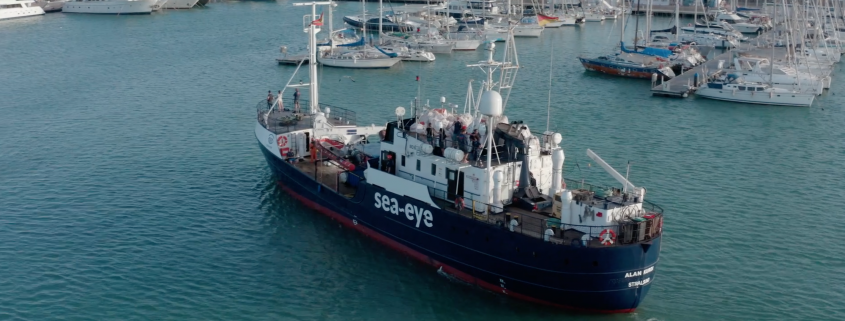ALAN KURDI Returns To Sea
Sea-Eye condemns German conception of a “European solution”
- ALAN KURDI returns for another mission after four months
- Spanish authorities support the view of the German authorities
- Sea-Eye criticizes German engagement after the fire in Moria
- Sea-Eye appeals to home port city of Hamburg
ALAN KURDI returns for another mission after four months
After a four months long forced break, the Sea-Eye rescue ship ALAN KURDI returns to sea for its next mission. It left the Spanish port of Burriana on Friday evening. After the last rescue of 150 people, Italian authorities had detained the ALAN KURDI in Palermo at the beginning of May, during the Corona-crisis. In August, Sea-Eye filed a lawsuit against this administrative act before the administrative court in Palermo, the verdict is still pending. The forced detention by the Italian authorities prevented a total of three of the ship’s planned missions. According to the IOM, 252 people drowned in the ALAN KURDI’s operational area during this period.
Spanish authorities support the view of the German authorities
Immediately after the detention, the responsible flag state authority in Germany confirmed that the ALAN KURDI is correctly equipped and certified according to its category. Sea-Eye used the forced break to make numerous technical improvements to the ship. The Spanish port state has now affirmed the position of the German flag state authority. After checking the technical equipment and certification by an extensive port state control, Spain granted the ALAN KURDI permission to cast off and informed the German and Italian authorities.
“There was no objection from Italy on Friday. But we have to expect discussions about sewage systems and yet another port state control by the Italian authorities”, said Gorden Isler, chairman of Sea-Eye e. V.
Sea-Eye criticizes German engagement after the fire in Moria
“The ‘European solution’ is a fairy tale which implies that something good is still to come. We have been witnessing the actual, European solution for 5 years. 20,000 dead in the Mediterranean, 12,000 people seeking protection in Moria and 69 deportations on the 69th birthday of our Interior Minister, Horst Seehofer”, says Isler about the German federal government’s commitment to the fire disaster in the Moria refugee camp.
The Federal Minister of the Interior said in a session of the Bundestag on Friday that Germany was ready to evacuate up to 150 children from Lesbos. He called this measure i.a. “an act of Christian charity”. There is still no solution for the more than 12,000 homeless people seeking protection on Lesbos.
Sea-Eye appeals to home port city of Hamburg
Immediately after the fire in Moria, various federal states declared their willingness to evacuate people from Lesbos. North Rhine-Westphalia would be ready to evacuate a total of 1,000 people. In the meantime, various federal states are working on a Federal Council initiative that aims to enable the federal states themselves to help directly and to evacuate people. Berlin and Thuringia started the Federal Council initiative. Hamburg would now be the one to tip the scales. The expectations of Hamburg are high, since the politically Red and Green Hamburg has already declared itself a safe harbor.
“Such a declaration increases the responsibility to seize the opportunity and to join this historic Federal Council initiative”, says Gorden Isler, Chairman of Sea-Eye.
In one week, the Federal Council initiative will be voted on in a plenary session of the Federal Council, under ITEM11. Immediately after the disaster, the Hamburg Senator of the Interior Andy Grote declared that Hamburg was ready to take people in. If the other senators of the Hamburg SPD follow him, the approval of the Green government partner should be nothing more than a matter of form.
“Hamburg is the home port of several NGO rescue ships. Now we are appealing to the Hanseatic city itself not to ignore this humanitarian tipping point and to flip the switch in the Federal Council for a human rights-based policy”, Isler continues.


 © Karsten Jäger/sea-eye.org
© Karsten Jäger/sea-eye.org